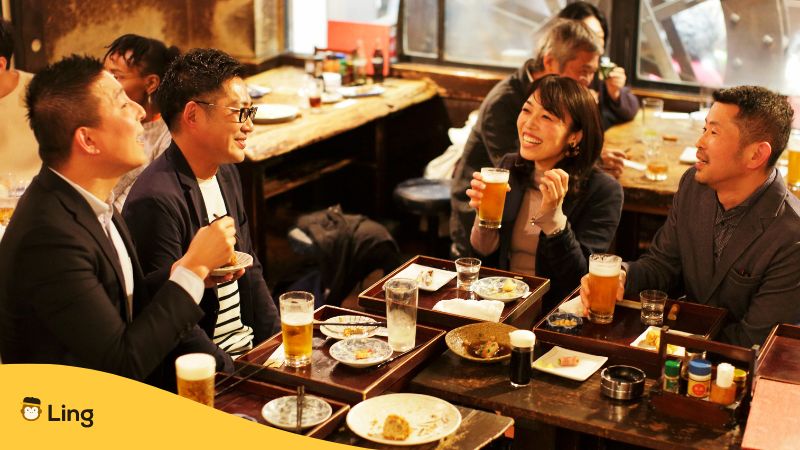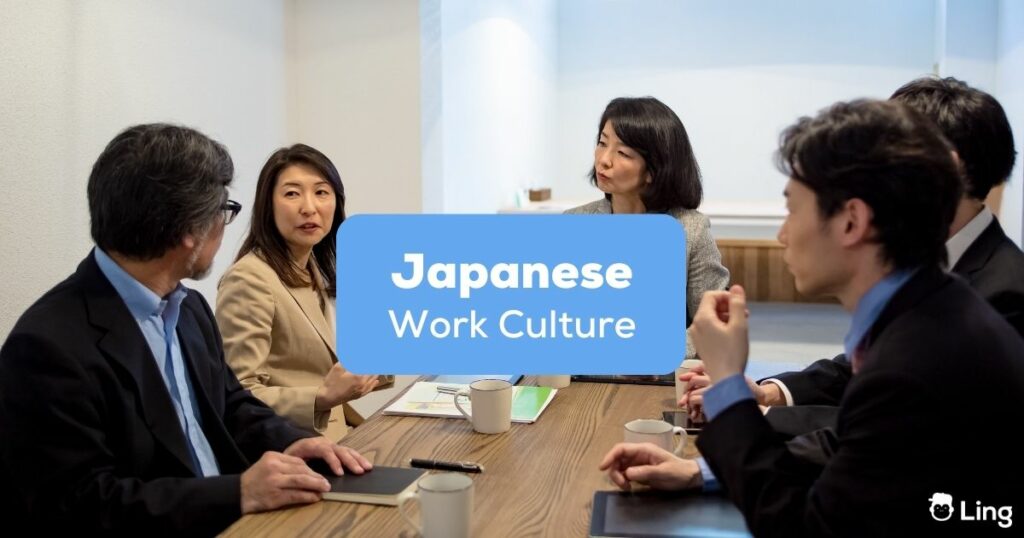Hey, have you ever heard the words Shūshin koyō (終身雇用)? It means permanent employment in the Japanese language and comes from the concept of ‘lifetime employment’ that Japan pioneered in the last century. These words reflect the work culture of Japanese people and their corporate ethos of valuing loyalty and job security.
While lifetime roles are rarer today, the core cultural emphasis on dedication and harmony within companies persists. Japanese employees take pride in their diligence and mastery of skills. For expatriates like yourselves, appreciating these venerable traditions blending with modern realities is key.
In this article, let’s look at the central aspects of Japan’s work culture and how you can adapt sensitively to integrate smoothly as a foreigner. We’ll also learn the proper ways of speaking the corporate Japanese language.
Table Of Contents
Brief Background: Work Culture Of Japanese People
The work culture followed by most Japanese companies and employees reflects Japan’s unique history, values, and practices. It’s deeply rooted in Japanese traditions that go back centuries.
Some major characteristics include lifetime employment, seniority-based promotion, collective decision-making, and after-hours socializing rituals. This Japanese business culture originated in the early 20th century at companies like Mitsubishi and Toyota. It helped Japan rapidly industrialize and became entrenched due to government policies, as well as the conformist nature of Japanese society.
However, globalization and younger generations are now pushing Japanese firms to adapt their traditional work practices. The tech sector and foreign companies are pioneering more relaxed work cultures. However, Japanese business culture still impacts most major companies and Japanese workers today.
An Overview: Key Aspects Of Japanese Work Culture
One of my school friends, who worked in an Indian corporate setup that worked directly with Dentsu – the Japanese PR and advertising giant – once shared her experience of the Japanese work environment with me. She had spent two months in Japan as part of her collaboration.
According to her, the most important facets of work culture in Japan that foreigners should understand include the significance of hierarchy, loyalty, and group harmony. Plus, being a fellow Asian, the expectation of extreme dedication and long hours, indirect communication and consensus-building, and participating sincerely in company social events was nothing new to her. However, for expats and professionals traveling from other parts of the world, adapting to these norms while balancing with individual preferences is key to enjoying their stay in Japan.
For them, entering Japan to work and gaining cooperation requires respecting cultural differences. Open and flexible attitudes help enrich professional experiences. That’s why, in this article, I’ve tried to summarize the main features of Japanese work culture. Read further, and you’ll find actionable tips to integrate smoothly in the Japanese workplace.
Hierarchical Structure And Harmony
Understanding the workings of a setup starts with understanding its hierarchical structure. So, let’s get going with understanding the Japanese corporate culture, its hierarchy, and its significance.

Importance Of Hierarchy, Status, And Seniority
Hierarchy and seniority are very important in Japanese job titles and companies. The Japanese language has specific honorifics and titles to denote seniority. In short, elders are respected everywhere – whether in personal or professional life.
At companies, the hierarchy might appear to be rigid. That’s because new employees usually join at the bottom and are promoted slowly based on tenure. Plus, challenging superiors openly can cause a loss of face. In fact, juniors are expected to dutifully follow orders from seniors.
It could be deduced that this hierarchical structure in Japanese working culture originated in Japan’s feudal past where peasants served lords. Back then, consensus and harmony were critical for survival. Over centuries, it became part of Japanese culture and entered its corporate culture too.
Many Japanese firms have now flattened hierarchies and empowered younger talent. But vestiges remain, especially at traditional companies, and status symbols still matter.
Group Harmony Vs. Individual Interests
The cultural emphasis in Japan is promoting harmony and conformity within the group over individual interests, like in many other Asian cultures. Open confrontation or strong dissent is frowned upon and might be considered taboo in many places.
Meetings involve reading subtle cues. My friend shared a slightly embarrassing (for her, it was hilarious to me!) experience that she had while working with the Japanese people. Now, according to her Indian experience, speaking up in meetings and assertively putting across your views is seen as a symbol of strong leadership quality. However, that happened to be a gaffe according to her Japanese colleagues. That’s because leadership decisions come through extensive behind-the-scenes consensus building.
Plus, maintaining harmony is paramount. This group orientation again has roots in Japan’s cooperative agrarian history and culture. Companies adopted this value for unity. But doesn’t excessive harmony focus dampen creativity? You be the judge!
Implications For Foreigners
The hierarchical structure and harmony focus could puzzle Western expatriates and professionals initially, no doubt. My guess is that coming from individualistic cultures, they may find the lack of open debate frustrating.
However, the expat community must adjust its communication style. For instance, they can avoid directly contradicting colleagues or seniors. And it’s much better to raise objections gently and privately and suggest changes respectfully over time. Understanding Japan’s hierarchy and harmony norms helps foreign professionals adapt sensitively. With an open mindset, they can definitely gain cooperation and succeed in Japanese companies.
Work Ethics And Loyalty
Let’s look at the work ethics that rule the work culture in many Japanese companies.

Extreme Diligence And Dedication
Japanese employees are renowned for their tireless work ethic, diligence, and dedication to their companies. Clocking long hours daily and perfectionism are the norm.
This extreme work devotion originated post World War II when Japan rebuilt itself as an economic powerhouse through sheer employee diligence. Companies demand such loyalty even today.
Weekends and vacations often get sacrificed. Presenteeism matters more than productivity. Such overwork does take a toll on employees’ personal lives and well-being.
However, younger talent is now pushing back against excessive overtime. But it’s difficult to overcome decades of cultural expectations of diligence and self-sacrifice for work overnight.
Long Working Hours
Japanese employees frequently work 10-12 hours daily. Going home before the boss is considered taboo. Meetings can stretch on for hours, painstakingly going over details. According to my friend, “The focus is on perfecting processes, not measurable profits.”
This, too, traces back to post-war rebuilding, when methodically improving processes helped Japanese firms gain global market share. But it could be argued that over-analysis leads to slow decision-making in today’s time, doesn’t it?
Loyalty And Lifetime Employment
The tradition of lifetime employment at one company defined post-war Japanese work culture. Sounds crazy, right? I had to leave a job after 5 years at it just because I got bored of it and needed a change of pace! But in Japan, job security and loyalty are highly valued.
This helped firms retain talent and knowledge. Workers repaid lifetime loyalty with their extreme dedication. This culture has eroded with the increased mobility of younger talent. But it remains ingrained, especially in older Japanese companies.
What This Means For Foreign Professionals
As a foreigner, you would need to adapt to the expectations of diligence, face time, and loyalty to colleagues, superiors, and the company. Avoiding entitlement and emphasizing commitment helps gain acceptance. Over time, you could persuade Japanese colleagues positively toward a healthier work-life balance.

Communication Norms
Communication is the key bridge between any two individuals. When looked at in a professional setup, learning to communicate in a culturally appropriate manner becomes even more imperative.
Reading Between The Lines
Communication in Japanese companies tends to be extremely formal, reserved, and indirect. Direct confrontation or expressing opinions publicly is frowned upon in order to preserve group harmony.
There’s a lot of reading between the lines to grasp real meanings. Yes doesn’t always mean yes, and no doesn’t mean no. Real disagreements are expressed subtly through body language and cues. My friend can vouch, no doubt!
This formal, indirect style originated from cultural norms of courtesy, humility, and conflict avoidance. It’s somewhat similar to Indian corporate culture too, that I’ve experienced around me. However, this excessive indirectness can lead to ambiguity for foreigners.
Conflict Avoidance
Openly expressing dissent or contradicting colleagues causes loss of face in Japan’s harmony-centric culture. Confrontations are avoided by discussing offline and finding common ground.
Meetings aim to build consensus through subtle cues. Presentations contain few sharp questions. This allows smooth group functioning but hinders innovation sometimes.
Using Proper Language To Show Respect
The Japanese language has complex sentence structures for polite speech. Verbs, honorifics, and titles signify the social standing of the speaker and listener. Using the proper language for one’s position is mandatory. Status impacts communication patterns. Juniors cannot directly contradict seniors.
Tips To Communicate Effectively
- One must adapt to indirect Japanese communication norms.
- Bluntness can offend, so the objections should be phrased gently and privately.
- Listening more and talking less helps.
- Mastering basics like polite speech, humility, and courtesy in language use goes a long way.
Remember, with cultural sensitivity, one can communicate effectively.
After-Hours Socializing
Yes, everyone needs to let their hair down after a grueling day at work. But Japan takes it a notch higher by actually making it some kind of ritual and giving it a name!
Nomikai With Coworkers And Bosses
It’s very common in Japanese work culture to have nomikais – social drinking parties – after office hours along with coworkers, bosses, and clients. Nomi (飲み) literally means to drink, and Kai (会) means “gathering,” so Nomikai can be translated into a drinking gathering or a drinking party.
Nomikais allow people to bond informally. They originated as a way to build stronger ties and smooth group functioning after strict office norms. Drinking helps release inhibitions. However, excessive drinking also happens under peer pressure.
Attending and actively participating in nomikais is crucial for Japanese employees. Rejecting invitations frequently hurts one’s reputation. Many work discussions also happen in nomikais.

Building Social Capital And Work Relationships
For Japanese people, socializing outside work is critical for building trusting relationships. This helps strengthen workplace cooperation and performance.
Nomikais provide opportunities to mingle with senior management and gain insights beyond formal work interactions. They are venues for proving one’s commitment to the team.
For foreigners and ex-pats, nomikais allow absorbing cultural and language knowledge. But balance is required. One must exercise judgment in drinking etiquette. Refusing drinks outright can seem rude. But over-indulgence loses face.
Joining conversations, asking questions, and speaking Japanese help foreigners integrate. But loud banter and over-confidence backfire. With culturally-sensitive conduct, you can definitely leverage nomikais.
Conformity Vs. Standing Out
Japanese society places intense pressure to conform to social norms and expectations. Standing out from the group is frowned upon in this collectivist culture.
Behaviors like speaking loudly, boasting, arguing publicly, or criticizing colleagues openly are avoided. Blending in harmoniously is valued.
This conformity expectation emerged from Japan’s communal history, where uniting as one entity was key to survival. It was reinforced during industrialization when companies relied on uniform diligent workers.
Challenges Of Standing Out As A Foreigner
Expatriates stand out immediately because of their race, physical appearance, speech, and conduct. As a foreigner, one might be excluded from informal networks and viewed as an outsider. Blending into the group and gaining peer acceptance is crucial but challenging.
So, what to do? Well, one should avoid behaviors perceived as arrogant, individualistic, or disruptive and focus on assimilation as far as possible.
Balancing Assimilation And Maintaining Individuality
As a working professional in a foreign land, one should aim to sincerely assimilate into the workplace culture as an expatriate. But it’s possible to retain core individual strengths and principles.
For example, participating enthusiastically in office rituals and traditions signals commitment. Nevertheless, certain unhealthy norms can be questioned tactfully.

Key Takeaways: Navigating Japanese Work Culture
The most crucial learning when it comes to Japanese work culture is appreciating the deep historical and cultural traits like hierarchy, diligence, conformity, and group harmony.
Adapting sensitively as an outsider and gaining colleagues’ trust is vital. Learning the language and etiquette shows commitment while participating enthusiastically in office rituals like nomikais builds bonds.
Furthermore, avoiding confrontational communication prevents friction. Still, with time, suggesting changes positively becomes possible. This way, blending in while retaining individual strengths becomes a balancing act.
Recommendations For Adapting Effectively As An Expat
To thrive as an expatriate or a working professional from another country, one must approach differences with patience and openness – not judgment.
You should demonstrate diligence and commitment to the team. Mastering formalities like titles in the Japanese language can smooth integration, and seeking coaching from bilingual Japanese mentors can help you navigate the nuances. Language learning apps with cultural contexts, like the Ling app, also come in handy in such situations.
Joining social events, asking questions, and aligning with core Japanese values of harmony, loyalty, and humility will help you gain acceptance.
In The End
With cultural sensitivity and courage, one can firmly plant their feet in the Japanese workforce. Japan’s work culture will likely continue evolving, and your foreign perspective can add unique value during this transition, so don’t let the cultural differences deter you.



































































